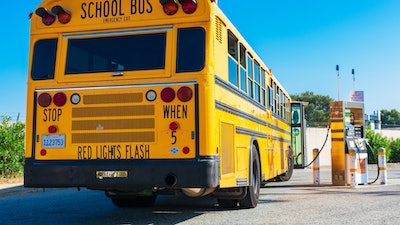
Electric School Buses Are Taking Students Back to School
Schools across the country are making a considerable effort to switch to more sustainable mobility by replacing their diesel Buses with electric ones.
Most school students in the US rely on the iconic yellow bus to get to school every day. Numbers say that more than 25 million of them ride 500 diesel Buses on a regular basis, but that is about to change, schools all over the US are entering the electric age.
There are many arguments to make the case for this change, the main one being the pollution and its effect on the kids’ health and school performance. Studies say that diesel school buses produce more than 5 million tons of carbon dioxide emissions. Students' exposure to this high level of pollution causes numerous cases of decreased lung function leading to an increase in hospital admissions and emergency room visits. What makes things worse is that School buses usually idle their engine while loading and unloading children, which exposes them directly to harmful particles.
A switch to electric buses would automatically protect school children from this dangerous level of air pollution.
Studies even showed how students' performance in English and math has increased when using electric buses or diesel ones with emission reduction apparatus.
There’s no denying that changing the entirety of the yellow bus fleet requires huge investments, but schools should remain focused on the benefits and put the students' well-being ahead of economic issues. Although we’re going to see further down that electric buses hold a lot of economic benefits in the long term.
The happy news is that the transformation has already begun, since March 2022, 415 school districts or contracted fleet operators have pledged 12,275 electric school buses spread all over large urban centers and rural areas, in 38 states and two Native American tribal lands.
Starting with California, being always at the front of sustainable mobility, the state is spending almost US$70 million to replace more than 200 diesel buses with electric versions getting closer to its climate and air-quality goals.
Montgomery County also is making large strides toward a green school bus fleet, hoping that by 2025 it will replace 326 diesel buses and build five charging depots, serving a population of 160,000 students in 210 schools.
Another example is Virginia where utility company Dominion Energy announced in 2019 that it would deliver 50 electric buses for 16 schools;As an initiative to promote the change to electric buses where Dominion would bear the cost of building infrastructure and the cost difference between a diesel and an electric bus.
The main difficulty facing school districts to switch to electric buses is the considerable cost of purchasing electric buses and building the necessary infrastructure. An electric bus costs about $400,000 which is more than double the cost of an average diesel bus.
Space also is a big issue, schools need adequate infrastructure to house, charge and maintain their new electric fleets, often while caring for their existing diesel fleets as well. And that’s a tricky logistical problem to deal with.
But when considering the long term, electric buses are a lot more economic than their diesel counterparts. Estimates say that using electric buses reduces the operation cost by $4,000 to $11,000 per bus per year. And that’s mainly due to the reduced maintenance requirements.
Fueling also won’t be an issue, electric buses can be charged right where they’re parked, with the possibility to program the charging outlets to charge when the overall electric consumption is at its lowest and when the electricity cost is cheapest.
Now the federal and state governments are realizing the benefits of electric school buses, and several programs are being enacted to provide the necessary funding to purchase buses and build the infrastructure all over the United States.
The yellow bus is a huge part of everyone’s childhood memories, and making it greener and healthier is a huge step forward toward a more sustainable and healthy future for our children.
You may think that car covers are just something for small cars. But no, Coverking strongly believes that all vehicles deserve their fair share of protection no matter their type or size. Coverking makes custom-made covers, specially made for RVs and Buses. Made from the most robust fabrics, Coverking RV covers are made to last, protecting your large vehicle from all kinds of dangers lurking around it.
Resources



